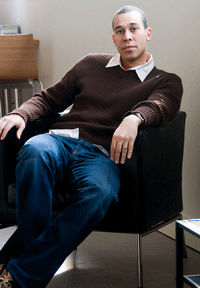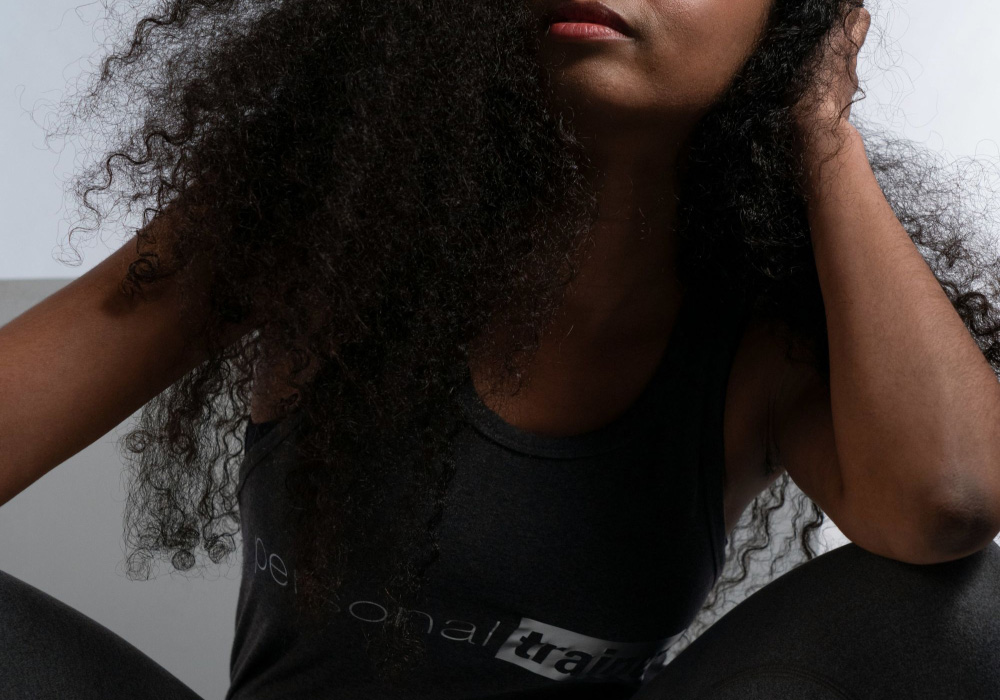
Photo by Joseph Michael
Hubert Davis grew up in Vancouver, BC, and was raised by his mother. Davis is a writer and director who earned his BA in Film & Communication at McGill University in 1999. He also studied Creative Writing at the University of British Columbia with screenwriter Peggy Thompson (The Lotus Eaters, Better than Chocolate). Hubert Davis is a filmmaker and a commercial director at Untitled Films. He worked as a Commercial Editor with the edit house Panic&Bob from 2002 until 2005. His work has been reviewed in various media, including publications such as Who’s Who in Black Canada (by Dawn P. Williams), Metro newspaper (in French and English), The Vancouver Sun, Sway Magazine, The Globe and Mail, Le Devoir, Canada AM, CTV.ca, etc.
Since his teenage years, Hubert Davis knew that filmmaking was his thing. “I knew I wanted to be a filmmaker when I was 17. I saw two films that really had a strong effect on me: Spike Lee’s Do The Right Thing and Martin Scorsese’s Goodfellas,” he expressed during our interview. As an aspiring filmmaker, his first work, Hardwood, received an Oscar nomination in 2005 for Best Short Documentary and an Emmy in 2006 for Outstanding Cultural and Artistic Programming for his directorial debut. For this short film, Davis became the first Afro-Canadian in history to earn a nomination for the prestigious Academy Award and for an Emmy.
Mr. Davis learned of his nomination when he clicked on the Academy Awards site in 2005. He shared how he felt about being the first Afro-Canadian filmmaker nominated for an Oscar and an Emmy for his first documentary. “ There are so many great African-Canadian filmmakers that came before me – Clement Virgo1, Stephen Williams2, Sudz Sutherland3, just to name a few. So, it’s a huge honour,” he said. Thus, he extols filmmakers who paved the way to future directors as himself.
The documentary Hardwood is divided into three movements — "love," "recollection," and "redemption." Hubert Davis directed, edited and wrote this documentary. Hardwood is a tour de force autobiographical documentary. The film is based on his father, Mel Davis, a former Harlem Globetrotter and NBA basketball player (in the ‘70s) and their family relationship. Hardwood explores many themes, such as the parallel element of Davis' childhood fascination with his dad's celebrity.
Hardwood premiered in 2004 and has been screened at over 30 film festivals. It has gained wide acclaim as well as various awards. The documentary allows the viewers to understand the dynamics of family, of not having a father or of meeting another sibling later in life. These are worldwide and boundless issues. The National Post (Toronto) wrote that Hardwood is “a fascinating and deeply personal documentary about history, hoops and the human heart”.
At first, Davis only hoped to create a documentary about his father’s life (in Hardwood) as a professional basketball player. Hardwood, in the end, became a reflection of his family and the courage they showed by sharing their personal stories. When asked if he had some reservations at the beginning about taking a personal road, Davis responded: “ Making Hardwood a personal film was an extremely tough choice. It took a lot of time to get my head around it – but ultimately, the decision became about what was going to do the best project”. Hardwood evoked emotions and became a catalyst for healing, redemption, enlightenment and openness.
Regarding the additional work of Mr. Davis, his 10-minute fictional short, Aruba, was presented at the Sundance Film Festival in 2006. He received the Don Haig Award for top emerging Canadian director at the 2007 Hot Docs Canadian International Documentary Festival. Hubert Davis worked on other films such as The Republic of Love as an assistant editor and Bollywood/Hollywood (directed by the Indo-Canadian Deepa Mehta, who received an Oscar nomination and Genie Awards for Water in 2006 and 2007). She had an early influence on Davis’s filmmaking career: “ Before directing, I worked on post-production. I had the chance to work with Deepa Mehta. She was one of the first directors I got to see work behind the scenes. It always becomes more realistic to pursue your dream when you get a chance to see people doing it – it makes it real”, he said.
Invisible City (a TVO-NFB production) is Hubert Davis's latest documentary. It is the story of young residents from Toronto’s Regent Park, Canada’s oldest public housing project. The Regent Park Revitalization plan involves tearing down the existing community over the next 15 years, which has raised many questions, one of the most important being: What will happen to the displaced community?
Invisible City focuses mainly on the lives of two teenagers, Kendell and Mikey (who are childhood friends), in their last years of high school. Those teens and their mothers could share very personal issues in front of the camera. When asked how he was able to make them open up in such a profound way, Davis stated: “I think I just try and come from a place of understanding. I am not there to judge anyone – I am there to ask questions and really listen to what people are saying”.
In the film, Davis introduces viewers to Ainsworth Morgan, a former Canadian Football League player who grew up in Regent Park and returned to work as a teacher and mentor. Mr. Morgan introduced Mr. Davis to the two teenagers and was instrumental in allowing the filmmaker to enter the world of Kendell and Mikey.
Hubert Davis explained during our interview why it was important for him as a director to make a film touching subjects such as racial profiling, issues surrounding the school system, and the absence of older male role models: “I wanted the film to reflect candidly and honestly the many issues that several young, black men face in the city today. At the same time, I don’t want to simplify or sensationalize those issues either.”
Redemption is a recurring theme in Davis’s documentaries. The filmmaker commented on this aspect, which we also find in Invisible City: “Redemption is an important part of my films because I believe we can always change our lives for the better.”
It is essential to note that Mr. Davis was inspired by Ralph Ellison’s classic American novel Invisible Man, which used numerous images, metaphors, and allusions to enhance the book's emotional and intellectual impact. Hubert Davis related why it was fundamental to use Ellison's invisibility allegory for his documentary: “I think most young people feel invisible. Growing up isn’t easy for anyone, but if you are also facing issues of race and poverty, then I think the realities of how one is perceived are even more profound. Do people really see you, or do they just see the clothes you wear and the neighbourhood where you are from?”
Invisible Man was narrated in the first person by an unnamed African-American man who considers himself socially invisible. We can draw a parallel between this novel and the reality of the kids at Regent Park, who are dealing with invisibility in a figurative sense. The metaphor of invisibility is used to depict the struggles of growing up in an inner city housing project, where issues of race and crime, success and failure, and family and manhood can affect the outcomes. Likewise, in Ralph Ellison’s novel, the boys at Regent Park are looking for their identities and their places in society. The title Invisible City depicts the lives of those young people in a candid way.
During the interview, Hubert Davis shared how he wishes Invisible City will impact the youth: “I hope young viewers, whatever their background, will be able to see some of themselves or people they know in the film”. Invisible City premiered at the Royal Theatre in Toronto and was shown on TVO in February 2010. The French version of the film La Cité Invisible was also presented during Black History Month 2010 at the ONF (The French sector of NFB in Quebec). Invisible City ends with a very powerful quote. It will be up to the future viewers to discover it when they will see a screening.
During the interview, Mr. Davis was asked what advice he wished he had been given when he was in the process of becoming a filmmaker. Thus, Hubert Davis gave us some advice for young people who want to follow his path: “Figure out what kind of stories you want to tell and be persistent. Never, ever give up”. He added: “I think it’s important for young people to understand it’s very hard to break into filmmaking. So, you have to be prepared to get a lot of rejection. You need to have a thick skin”.
To sum up, Hubert Davis is a brilliant filmmaker with a great capacity to evoke powerful emotions in his documentaries and to illuminate hidden issues with unequivocal messages. As aforementioned, Hardwood and Invisible City are about the power of redemption and the healing of the bonds between one another. Davis knows how to bring layers of emotions and nuance into his films. His documentaries are notches above other films of its genre. His remarkable works should be translated into numerous languages.
At the end of the interview, the filmmaker concluded by letting us know about his future plans: “ I am currently working on a couple of dramatic feature projects.” Based on Davis’s past body of work, we are anticipating his next productions.
Invisible City will be available on DVD next June at:
www.nfb.ca/boutique and our public centres, the Mediatheque here in Toronto and the Cinérobothèque in Montreal.
Interview conducted by the reporter Patricia Turnier in March 2010 (
Nominations for Hardwood:
- Oscar nomination in 2005
- Emmy nomination in 2006
Additional awards:
- Golden Sheaf Award of Excellence, Yorkton Short Film & Video Festival, 2004
- World Wide Short Film Festival Best Documentary, 2004
- Hardwood was also selected for the InFact Film Series in LA, 2004
- Big Sky Documentary Film & Video Festival Best Documentary Short Award, 2005
- Black Maria Film & Video Festival (a Jury’s Choice), 2005
Award for Aruba: Palm Springs Panavision Grand Jury Award 2006 Award for Invisible City: Hot Docs Film Festival Best Canadian Feature 2009




